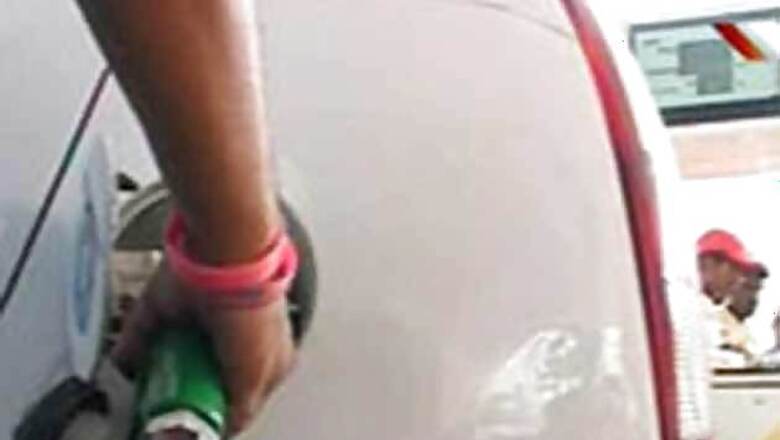
views
New Delhi: India raised the price of heavily subsidised diesel on Thursday, in a politically risky move to rein in the fiscal deficit and fight the threat of being the first in the BRICS group of emerging economies to be downgraded to junk.
A cabinet committee agreed to raise diesel prices by 12 per cent, or 5 rupees per litre, and restricted sales of subsidised LPG cylinders to six per consumer annually, the government said in a statement. It left petrol and kerosene prices unchanged.
Comments:
Manish Wadhawan, MD and Head of Rares, HSBC, Mumbai, says, "It is the first credible step towards fiscal consolidation that the government has taken, something for which the market has been waiting for long. It also gives some hope for rate cut by the Reserve Bank of India."
"The expectation will get built for a rate cut on Monday. It is too early to talk of an impact on the rating agencies, but it will definitely be positive."
A Prasanna, Economist, ICICI Securities, Mumbai, says, "The first round impact of the diesel price hike will be 60 basis points, which will have full impact in October. We have to see impact of the LPG cylinder cap on WPI. I still think it is too early for a rate cut in September. But the chances for a rate cut in October have gone up."
Shubhada Rao, Chief Economist, YES BANK, Mumbai, says, "I would think that at least this demonstrated some courage, perhaps a small step."
"One would have been happier to see a much larger step, but I think the positive takeaway is, after a very, very long time the government has actually been able to take some measure without dithering."
"One just hopes that there is no back-tracking of this measure, and they continue to move ahead piecemeal fashion, especially in subsidy management."
G Chokkalingam, Chief Investment Officer, Centrum Wealth Management, says, "Market would be enthused by government's move on diesel prices. It is a major positive for the markets. There would be more confidence now on other reform measures too.
"Stage is set for RBI to cut rates by 50 bps on Monday."
Paras Adenwala, MD and Principal Portfolio Manager, Capital Portfolio Advisors, says, "5 rupees increase in diesel is much beyond the expectations. This is wonderful news, fundamentally. It sends the right signal, they have managed to act finally on fuel prices.
"Let's hope there is no rollback now. If there is no rollback it will be taken very positively by FIIs."
Indranil Pan, Chief Economist, Kotak Mahindra Bank, says, "Obviously, this is a positive signal because it shows the government is ready to move. But this is only the first step, and lot more needs to be done to bridge the fiscal gap.
"It is not clear by how much the government would be able to reduce its subsidy on LPG by restricting supply to six per year per consumer.
"The rise in diesel price is likely to add about 25 basis point to headline inflation."
Sandip Sabharwal, CEO - PMS, Prabhudas Lillasher, says, "Diesel price hike sends a positive signal and the fact that it is done a few days ahead of RBI policy clearly shows government wants the central bank to cut rates.
"If RBI follows up then we are looking at 5800 on Nifty in near term."
RK Gupta, MD, Tayrus Mutual Fund, says, "Such a huge jump in diesel prices is a big positive, it will bring down budgetary deficit, current account deficit will reduce but inflation will go up.
"All these days RBI was insisting government should take steps to control fiscal deficit, after this move there are all possibilities that the central bank may consider to reduce interest rates on Monday.
"This is very good news for the market, FIIs will be taking this as a positive step, this will also improve the country's ratings."
Background:
-- New Delhi subsidises the prices of diesel, cooking gas and kerosene to dampen inflation and protect the poor, a popular policy that has nevertheless put a severe strain on public finances.
-- The rising bill from the fuel subsidy and the resulting strain on public finances have put India's investment grade credit rating in peril.
-- India's rate of inflation probably picked up in August from July's near three-year low as poor summer rains drove up food prices, a Reuters poll showed.
-- The Reserve Bank of India is expected to keep its key interest rate steady when it reviews its monetary policy on Monday, according to a Reuters poll earlier this month. It has called on the government to free up supply constraints that have pushed up food prices, and launch fiscal reforms.




















Comments
0 comment